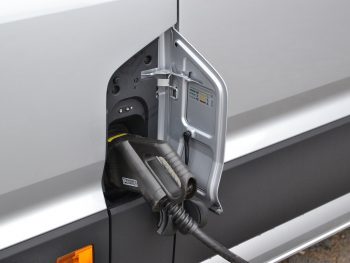A lack of action by the Government is holding back adoption of electric vans and slowing the growth of market share, according to the National Franchised Dealers Association (NFDA).

Following the publication of latest new van registration figures, the association says eLCVs are not performing to expected volumes within the market and it wants the Department for Transport to take action.
Year-to-date registrations of fully electric LCVs only made up 5.2% of the market in the new SMMT figures, the exact same share as for the first five months of 2022 and some way behind the new car market.
To spur action, the NFDA’s Commercial Vehicles division has sent a letter, urging the Government to provide a response to its own consultation on the weight classification of electric vans in the UK and ways to support operators switching to eLCVs.
Although the consultation closed in October last year, the DfT is yet to provide a response and the NFDA-CV says it’s repeatedly called for the naturally heavier EVs not to fall into the O Licence regulatory class, which brings a raft of safety measures and licensing that present extra challenges for fleets.
Sue Robinson, chief executive of the NFDA, said: “There is an evident issue regarding the uptake of battery electric light commercial vehicles, which is an ever-pressing issue with the 2030 net zero target approaching. The NFDA would like to see more support from the Government’s Department for Transport, including incentives for battery electric LCV consumers. We would further like DfT to address legislative issues that negatively affect their business usage.”
The NFDA’s comments come just days after the Association of Fleet Professionals (AFP) also warned that restrictions on heavier electric vans are hampering fleet take-up.
Typically, a driver must have a category C or C1 licence to operate a vehicle above 3.5 tonnes, increasing costs for the user. However, a derogation introduced in 2018 means that drivers with a category B (car) driving licence can drive an eLCV up to 4.25 tonnes, rather than having to get a C1 licence.
While the Government has said it has no plans to remove the derogation – and the aforementioned consultation explored ways to continue and expand on the current measures – the AFP, like the NFDA, says fleets are still being hit by restrictions.
Because the van is classed as an HGV, it needs an MOT test after 12 months and is also speed restricted, while tachograph regulations come into effect if the vehicle travels more than 100km (62 miles) from base.
Also, for fleets operating in Northern Ireland, the 4.25-tonne exemptions stop at the border for those travelling from the North into the South and the vehicle needs to be covered by an international O licence.
Speaking earlier this month, chairman Paul Hollick said: “If the idea of the concession is that fleets can easily choose a 4.25-tonne electric van instead of a 3.5-tonne diesel one, then that is not currently possible. There are just too many additional responsibilities.”
As with the NFDA, it’s lobbying for change.
“Unnecessary problems such as these 4.25-tonne issues create additional hurdles that are often difficult to resolve. We’ll be campaigning for the necessary changes and asking other industry bodies to support our efforts,” said Hollick.
Urgent investment needed in Northern Ireland for ‘dire’ charging network, says NFDA
In separate news, the National Franchised Dealers Association’s Northern Ireland Division has drawn attention to the “dire” EV charging network in the country and called for urgent support and investment.
Writing to Ministers and MLAs, the NFDA says that while the UK had a total of 37,055 charge points as of 31 January 2023, only 366 or 1% were located in Northern Ireland. For comparison, Scotland has 3,915, Wales 1,657 and Greater London 12,817.
It says that for NI to have a proportional share of public charge points, then it would need to build approximately 8,000 chargers by 2030, at a rate of over 1,000 charge points annually. However, data taken from DfT official charging device statistics indicates only a net increase of 21 public charge points between January 2022 and January 2023, showing that the current installation rate stands at only 2% of what it needs to be to reach the 2030 target.
The dealer organisation also warns that the level of investment in Northern Ireland is lacking in comparison to other places. The largest investment is still the £3.27m from the Levelling up fund. In comparison, the LEVI fund announced £381m to local authorities across England and the Republic of Ireland launched a new strategy which will see €100m (£855m) spent on charging infrastructure over the next three years.
The association is warning that this could hamper Northern Ireland’s transition to electric vehicles in the run-up to 2030
The NFDA’s Sue Robinson said: “It is critical that there is a sufficient charging network for electric vehicles in Northern Ireland to appeal to consumers and drive demand at a time where dealer networks are investing heavily.
“The current NI EV charging infrastructure is old, underperforming and broken in many instances and is disincentivising EV adoption considerably. To combat this, NFDA is calling for cross-party support on this important issue to ensure that developing the charging network is the key priority for the Transport Sector in NI and to put an end to the inertia that is all too common in Northern Ireland’s Public EV Charging projects.”

